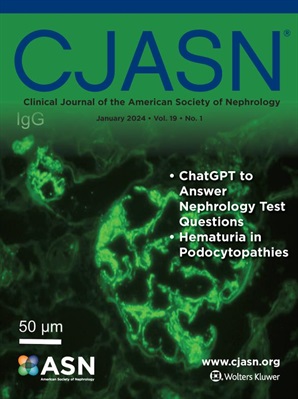African American Patients’ Perspectives on Determinants of Hemodialysis Adherence and Use of Motivational Interviewing to Improve Hemodialysis Adherence
IF 8.5
1区 医学
Q1 UROLOGY & NEPHROLOGY
Clinical Journal of the American Society of Nephrology
Pub Date : 2024-10-16
DOI:10.2215/cjn.0000000580
引用次数: 0
Abstract
it. We assessed perspectives of AA hemodialysis patients on unique factors impacting dialysis adherence, and use of motivational interviewing, an evidence-based intervention, to improve these factors, dialysis adherence, and outcomes in AAs. Methods: Self-identified AA hemodialysis patients (N=22) watched a brief video describing motivational interviewing and then completed a semi-structured interview or focus group session. Interview questions explored unique barriers and facilitators of hemodialysis adherence in AAs, and perceived utility of motivational interviewing to address these obstacles. Verbatim transcripts and an iterative inductive/deductive approach were used to develop a hierarchical coding system. Three experienced coders independently coded the same two transcripts. Coding was compared and discrepancies were reconciled by a fourth coder or consensus. Transcripts, quotations, and codes were managed using Microsoft Excel 2016 and SPSS version 28.0. Results: Themes and sub-themes emerged and culminated in a novel conceptual model informed by three theoretical models of behavior change: Theory of Self-Care Management for Vulnerable Populations; Social Cognitive Theory; and Self Determination Theory. This conceptual model will inform the design of a culturally tailored, motivational interviewing-based intervention to improve dialysis adherence in AAs. Conclusions: Integrating AA hemodialysis patient perspectives is critical for enhancing dialysis care delivery and the design of effective interventions such as motivational interviewing to improve dialysis adherence in AA and promote kidney health equity. AA hemodialysis patients view motivational interviewing as a tool to clarify patient priorities, build trust, and promote patient-provider therapeutic alliance. Cultural tailoring of motivational interviewing to address unique barriers of AAs with kidney failure will improve adherence and health outcomes in these vulnerable patients. Copyright © 2024 The Author(s). Published by Wolters Kluwer Health, Inc. on behalf of the American Society of Nephrology...非裔美国人患者对坚持血液透析的决定因素的看法以及使用动机访谈法改善坚持血液透析的情况
它。我们评估了 AA 级血液透析患者对影响透析依从性的独特因素的看法,以及使用动机访谈这一循证干预方法来改善这些因素、透析依从性和 AA 级患者的治疗效果。方法:自我认同的 AA 级血液透析患者(22 人)观看了介绍动机访谈的简短视频,然后完成了半结构化访谈或焦点小组会议。访谈问题探讨了 AA 族血液透析患者坚持血液透析的独特障碍和促进因素,以及动机访谈在解决这些障碍方面的作用。采用逐字记录誊本和归纳/演绎迭代法来开发分层编码系统。三位经验丰富的编码员对同两份记录誊本进行了独立编码。对编码进行比较,并由第四位编码员或达成共识的编码员对差异进行调和。使用 Microsoft Excel 2016 和 SPSS 28.0 版本管理记录誊本、引文和编码。结果通过三个行为改变的理论模型,产生了主题和次主题,并最终形成了一个新的概念模型:弱势群体自我护理管理理论、社会认知理论和自我决定理论。这一概念模型将为设计一种文化定制的、以动机访谈为基础的干预措施提供参考,以改善 AAs 的透析依从性。结论:整合 AA 族血液透析患者的观点对于加强透析护理服务和设计有效的干预措施(如动机访谈)以提高 AA 族透析依从性和促进肾脏健康公平至关重要。AA 族血液透析患者认为动机访谈是一种明确患者优先事项、建立信任和促进患者-医护人员治疗联盟的工具。针对肾衰竭 AA 族人的独特障碍对动机访谈进行文化调整,将改善这些弱势患者的依从性和健康状况。版权 © 2024 作者。由 Wolters Kluwer Health, Inc. 代表美国肾脏病学会出版...
本文章由计算机程序翻译,如有差异,请以英文原文为准。
求助全文
约1分钟内获得全文
求助全文
来源期刊
CiteScore
12.20
自引率
3.10%
发文量
514
审稿时长
3-6 weeks
期刊介绍:
The Clinical Journal of the American Society of Nephrology strives to establish itself as the foremost authority in communicating and influencing advances in clinical nephrology by (1) swiftly and effectively disseminating pivotal developments in clinical and translational research in nephrology, encompassing innovations in research methods and care delivery; (2) providing context for these advances in relation to future research directions and patient care; and (3) becoming a key voice on issues with potential implications for the clinical practice of nephrology, particularly within the United States. Original manuscript topics cover a range of areas, including Acid/Base and Electrolyte Disorders, Acute Kidney Injury and ICU Nephrology, Chronic Kidney Disease, Clinical Nephrology, Cystic Kidney Disease, Diabetes and the Kidney, Genetics, Geriatric and Palliative Nephrology, Glomerular and Tubulointerstitial Diseases, Hypertension, Maintenance Dialysis, Mineral Metabolism, Nephrolithiasis, and Transplantation.

 求助内容:
求助内容: 应助结果提醒方式:
应助结果提醒方式:


